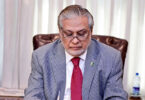F.P. Report
QUETTA: Chief Justice of Pakistan Mian Saqib Nisar has said that they have no power to legislate and those having the power do not legislate.
Addressing the lawyers on Tuesday, he said that the target-killing incidents have made him shameful.
The CJP said that the provision of basic human rights is their top priority. “There are too much cases in courts that we cannot hear,” he said.
He asked the lawyers not to go on strike and support them.
During hearing, the health and education secretaries of Balochistan faced the ire of Chief Justice of Pakistan Justice Saqib Nisar as he resumed hearing a suo motu case on various issues of public interest.
The three-member bench headed by Chief Justice Saqib Nisar heard the case.
The chief justice asked about the absence of former Balochistan chief ministers; upon which the lawyer said that the former chief ministers are currently in Turbat due to which they failed to appear before the court. The court then summoned both former chief ministers on April 30.
During the hearing, the chief justice remarked that the provincial government has failed to provide governance. The education secretary responded further that a lack of funds restricts improvement in the sector and also blamed the teachers’ union of politicizing everything.
During the hearing, the CJP warned Provincial Health Secretary Saleh Nasir of halting his salary until the province’s doctors are paid their dues. He also said that it was a matter of great concern that the province pays its doctors Rs24,000 a month whereas a driver of the Supreme Court gets paid Rs35,000.
Later, the Secretary Education Noorul Haq Baloch informed the court that half of the schools in the province don’t have water, adding that 11,000 toilets were constructed in the province’s schools in the last three years.
The education secretary also informed the court further that 1,135 primary schools that the government oversees do not have all the required facilities. The CJP remarked that the provincial government has failed to provide governance. The education secretary said that improvement in the region is hindered by a lack of funds and blamed the teachers’ union for politicising everything.
The CJP censured the officials in attendance in the court, saying they haven’t done any paper work, but are just paying lip-service. Upon this, the secretary said he has prepared data about schools based on the ground realities, but awaited funds to resolve the issues.
The CJP then asked him to submit a policy report in 15 days, observing that, “I used to think the situation is Sindh is dire but it is worse here”.
The hearing was then briefly adjourned after which the CJP left for a visit to the district courts where he interacted with lawyers and instructed authorities to improve the facilities there.






